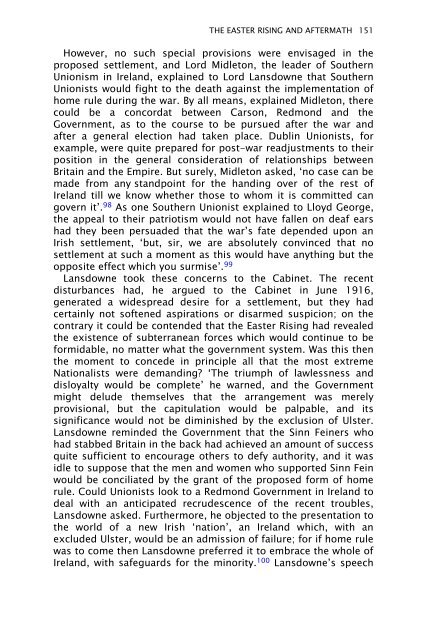Dividing Ireland: World War I and Partition
Dividing Ireland: World War I and Partition
Dividing Ireland: World War I and Partition
You also want an ePaper? Increase the reach of your titles
YUMPU automatically turns print PDFs into web optimized ePapers that Google loves.
THE EASTER RISING AND AFTERMATH 151<br />
However, no such special provisions were envisaged in the<br />
proposed settlement, <strong>and</strong> Lord Midleton, the leader of Southern<br />
Unionism in <strong>Irel<strong>and</strong></strong>, explained to Lord Lansdowne that Southern<br />
Unionists would fight to the death against the implementation of<br />
home rule during the war. By all means, explained Midleton, there<br />
could be a concordat between Carson, Redmond <strong>and</strong> the<br />
Government, as to the course to be pursued after the war <strong>and</strong><br />
after a general election had taken place. Dublin Unionists, for<br />
example, were quite prepared for post-war readjustments to their<br />
position in the general consideration of relationships between<br />
Britain <strong>and</strong> the Empire. But surely, Midleton asked, ‘no case can be<br />
made from any st<strong>and</strong>point for the h<strong>and</strong>ing over of the rest of<br />
<strong>Irel<strong>and</strong></strong> till we know whether those to whom it is committed can<br />
govern it’. 98 As one Southern Unionist explained to Lloyd George,<br />
the appeal to their patriotism would not have fallen on deaf ears<br />
had they been persuaded that the war’s fate depended upon an<br />
Irish settlement, ‘but, sir, we are absolutely convinced that no<br />
settlement at such a moment as this would have anything but the<br />
opposite effect which you surmise’. 99<br />
Lansdowne took these concerns to the Cabinet. The recent<br />
disturbances had, he argued to the Cabinet in June 1916,<br />
generated a widespread desire for a settlement, but they had<br />
certainly not softened aspirations or disarmed suspicion; on the<br />
contrary it could be contended that the Easter Rising had revealed<br />
the existence of subterranean forces which would continue to be<br />
formidable, no matter what the government system. Was this then<br />
the moment to concede in principle all that the most extreme<br />
Nationalists were dem<strong>and</strong>ing? ‘The triumph of lawlessness <strong>and</strong><br />
disloyalty would be complete’ he warned, <strong>and</strong> the Government<br />
might delude themselves that the arrangement was merely<br />
provisional, but the capitulation would be palpable, <strong>and</strong> its<br />
significance would not be diminished by the exclusion of Ulster.<br />
Lansdowne reminded the Government that the Sinn Feiners who<br />
had stabbed Britain in the back had achieved an amount of success<br />
quite sufficient to encourage others to defy authority, <strong>and</strong> it was<br />
idle to suppose that the men <strong>and</strong> women who supported Sinn Fein<br />
would be conciliated by the grant of the proposed form of home<br />
rule. Could Unionists look to a Redmond Government in <strong>Irel<strong>and</strong></strong> to<br />
deal with an anticipated recrudescence of the recent troubles,<br />
Lansdowne asked. Furthermore, he objected to the presentation to<br />
the world of a new Irish ‘nation’, an <strong>Irel<strong>and</strong></strong> which, with an<br />
excluded Ulster, would be an admission of failure; for if home rule<br />
was to come then Lansdowne preferred it to embrace the whole of<br />
<strong>Irel<strong>and</strong></strong>, with safeguards for the minority. 100 Lansdowne’s speech








